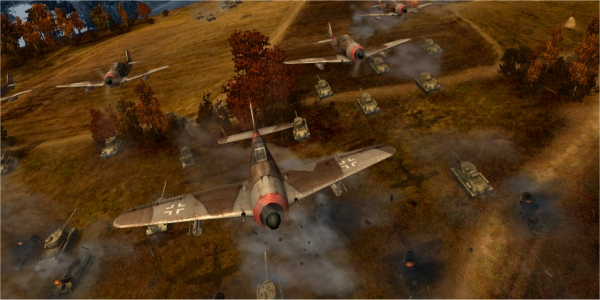Order Of War's Always-On DRM Fiasco Shows How Dangerous DRM Is

Order of War: Challenge is a real-time strategy game; it's a title that used to afford players massive multiplayer online battles and sported a single-player component during its run. It was affected by always-on DRM and relied on active servers to operate. Square-Enix shutdown those servers. The game ceases to function. Valve was forced to remove the game from Steam's user libraries because it became a digital dud.
Forbes' Erik Kain does a fantastic job of summarizing the travesty that is the security measure in the video game realm known as always-on DRM, also referred to as always-online digital rights management. The purpose of this blockade is to checkpoint gamers at the start (or the middle) of a game to ensure that they are the rightful owners of the content; that they aren't stealing anything or that there is no way to pirate the software.
All MMOS utilize always-on DRM for security and stability purposes, and as noted by Erik Kain...
When a game is solely online multiplayer (think MMOs like World of Warcraft) this is understood going in. We all know that if Blizzard shuts down WoW we won’t be able to play it anymore. There’s an agreement and an understanding from the get-go that at some point this may come to an end, and we’ll stop paying our subscription.
In the case of Order of War: Challenge, it was an extension of the standard Order of War and worked as a standalone expansion.
Even though the game shutdown back in September, news about it spread steady like Jeong-beom Lee's slow burn thriller The Man From Nowhere, leading up to an explosive wildfire umbrella over the news wires.
The ruckus about this game shutting down spawned from this message on the former Steam product page by Square-Enix's support staff...
“Whilst we have loved seeing you enjoy playing Order of War on Steam, unfortunately it is no longer viable for us to continue to run the multiplayer servers due to the low volume of traffic and so the servers were switched off on September 1st, 2013. The multiplayer aspect of Order of War and Order of War: Challenge have subsequently ceased to function, and customers will notice that Order of War: Challenge has been removed from their Steam library. For those who have been playing our game, we thank you for your support and hope you had fun.”
We've ran into this problem before, where always-on DRM prevented gamers from accessing titles like Diablo III and caused a massive firestorm from the community with SimCity earlier in 2013 and had EA under further scrutiny when DarkSpore ran into a DRM server hiccup.
Your Daily Blend of Entertainment News
This issue also calls into question that of ownership – while pro-corporatists will always regale the notion that gamers own nothing, the reality is that anyone with an older copy of a disc, cartridge or floppy can pop it into the respective slot and play the game. It's not a matter of owning the software itself but owning a means in which to access that software anytime you want. Always-on DRM prevents any measure of ownership whatsoever, and Erik Kain used a very fitting analogy to describe the feeling that succumbs some gamers when always-on DRM hits...
“I imagine purchasing a TV. It works fine for a couple years and then one night the manufacturer breaks into my home and sabotages it, and then a couple of hours later the retailer who sold it to me breaks in and hauls it off. I wake up in the morning and my TV is gone. A note explaining that the TV only functioned so long as the manufacturer wanted it to is sitting on the entertainment stand. Thank you for enjoying our product, we hope you go out right now and buy another one.”
Thankfully, the VZBV has been fighting hard to get gamers their fair shake from Steam. However, it's not really in Valve's hands. It's an issue that supersedes distribution portals, just like GOG.com has no control over Fallout games being removed from their services.
This here is a fight between gamers and publishers; a battle to be won based on who rewards publishers for taking away your rights. Supporting always-on games will only lead to losing those games in a foreseeable future where those titles are no longer going to be part of gaming history.
Staff Writer at CinemaBlend.

